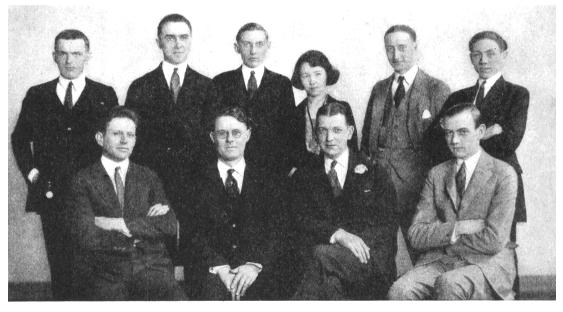 1920: A Detroit station airs what is believed to be the first radio news broadcast. The exact headlines of that day are of no historical significance, but with this local newscast a nascent medium finally conveys a message so compelling that it would soon capture the world’s imagination as only television and the internet would, many, many years later.
1920: A Detroit station airs what is believed to be the first radio news broadcast. The exact headlines of that day are of no historical significance, but with this local newscast a nascent medium finally conveys a message so compelling that it would soon capture the world’s imagination as only television and the internet would, many, many years later.
Radio had been around in a number of technical incarnations for decades, mostly for the enjoyment of hobbyists. Despite the general lack of public awareness — it was a technological contemporary of the telephone, mind you — radio was an obsession among an astonishingly large number of giant thinkers in the “Only One Name Is Necessary” club: Faraday, Maxwell, Hertz, Marconi, Tesla, Edison.
Radio’s commercial prospects were not yet fully appreciated, in part because wireless was considered primarily a “narrowcast” medium, a sandbox for the geeks of the day awed by the prospect of communicating over great distances over freely available spectrum. Radio communication was also standard aboard ships by the summer of 1920. Indeed, it was the unthinkable disaster that befell the unsinkable Titanic in 1912 which spurred widespread adoption of wireless at sea.
But on the cusp of the Roaring ’20s the notion that radio would be a mass medium and huge business was still a ways off. Stations in these loosely regulated early days broadcast in a metaphorical vacuum almost as large at the literal one which carried their sounds invisibly through the air.
Programming, such as it was, didn’t even have advertisers in the modern sense. Radio shows — all live, of course, and heavy on the music — were created and operated by radio-set manufacturers as a means of drumming up business, an early example of “software” driving sales of the “hardware” necessary to use it.
Also on the leading edge were newspapers, afraid that the immediacy of radio might someday render irrelevant their next-day coverage of … anything. (Why this history was not recalled later in the century when the internet actually was about to kill the newspaper business is anyone’s guess.)
In the case of what is now Detroit station WWJ, the strategy was all defense: The Scripps newspaper family sanctioned The Detroit News to start it up so the company could control what it thought in other hands might kill their dominance in the market.
Scripps was motivated to invent news radio, but didn’t exactly know how. And the company even wanted to hedge this bet, just in case radio turned out to be a passing fad with which they didn’t want their good name associated. So, in what would become a cliché of the internet age, they hired a teenager to build and explain it to them.
Scripps even instructed underage radio pioneer Michael DeLisle Lyons to obtain government permission for the station in his own name (there were no formal licensing rules yet), even though it was conceived of, owned and operated by The Detroit News and assembled in the newspaper building itself.
Lyons got permission to broadcast on Aug. 20, 1920, and for the next 10 days the station — what else? — played music to work out the kinks. “These concerts were enjoyed by no one save such amateurs as happened to be listening in,” The Detroit News reported about itself.
After 10 days of concerts, almost nobody had heard the station then called 8MK that was poised to make history. And in an amusingly self-congratulatory and hyperbolic story about itself — delivered, alas, no sooner than the next day — The Detroit News summed up the momentous event a few years later:
Everything was found to be satisfactory, and on Aug. 31, which was primary election day, it was announced that the returns — local, state and congressional — would be sent to the public that night by means of the radio.
The News on Wednesday, Sept. 1, 1920, carried the following announcement: “The sending of the election returns by The Detroit News’ radiophone Tuesday night was fraught with romance and must go down in the history of man’s conquest of the elements as a gigantic step in his progress.
In the four hours that the apparatus, set up in an out-of-the-way corner of The News Building, was hissing and whirring its message into space, few realized that a dream and a prediction had come true. The news of the world was being given forth through this invisible trumpet to the waiting crowds in the unseen market place.”
History would prove Scripps correct, of course, in ways big and small.
Radio is still a force to be reckoned with — despite television and the internet. In 1947, The Detroit News would go on to launch Michigan’s first TV station, WWJ-TV, now WDIV-TV. The newspaper entered into a novel arrangement with its rival, The Detroit Free Press, in 1989 under which they share business operations but maintain separate editorial staff.


